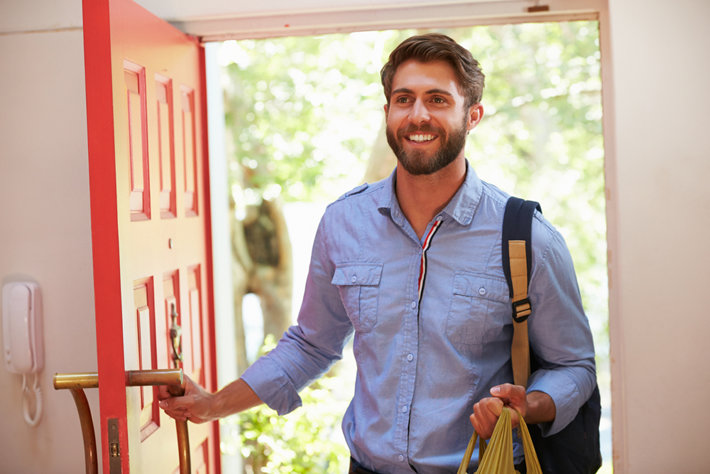Why Family and Friends Can Make or Break Sobriety for a Person in Recovery

It would be easy to think that recovery from addiction ends when an individual walks out the door after completing the program. But really, it’s not very often that way.
Yes, there are a few souls who never look back and just pick up where they left off pre-serious drug or alcohol consumption. But most people require significant support and even guidance as they assemble a new sober life.
For one thing, nearly everyone returns home with a pretty long to-do list. This list might include some of these items:
- Find a new job
- Re-enroll in school
- Look for a new place to live while staying with friends or family
- List everyone owed money and work out repayment
- Get rid of everything possible that triggers memories of drug use
- Start repairing relationships with spouse, former spouse, children, parents, siblings, neighbors
- Help family with yard cleanups or repairs as a way of making amends
- Sort out legal situations fully
- Find and attend support meetings
- Exercise regularly and eat better
- Keep a regular schedule and get enough sleep
Meeting Day-to-Day Challenges
For the person in recovery—just like everyone else—daily life will present challenges. The difference between an addicted person in recovery and everyone else is that an addicted person probably had a pattern of escaping from stresses and traumas by drinking or using drugs. Now, they have to work out entirely new coping mechanisms.
Friends and family can make all these steps easier, more pleasant and more successful by lending their support. Whether it’s getting through the to-do list or coping with setbacks, loyal and supportive friends and family can mean the difference between glowing success or traumatic failure for the person in recovery.
How Can You Help?
To be honest, there’s a very long list of ways you can help. Here are some ideas to help you adopt this new role.
- Don't Use Drugs or Drink Around Them. This may seem obvious, but it has to be said. Do not drink alcohol or use drugs around your friend or loved one who has just returned home from rehab. Even if they went to rehab for another addiction than alcohol, don't put them in a position that could make them feel uncomfortable or put an unnecessary temptation there. If you are planning a social gathering and you will be inviting your newly sober or drug-free friend, skip the alcohol. Show your support by proving that you can have fun without alcohol—it's a healthier decision for all involved anyway!

- Be patient and kind. While everyone is different when they walk out of rehab, realize that it may take time to adjust to their new way of living life drug-free—especially after years of drug or alcohol addiction. The real work begins after completing a good rehab program—this may take time, and that's okay. You can help make this transition easier by being patient and kind. If you must correct or critique something the person has done, do so with kindness in your heart.
- Validate and acknowledge. You don’t have to gush, but let them know you notice when they do a good job, especially if they show marked improvement over their prior behavior. If you see them struggle over a decision to do the right thing and then they make the correct choice, let them know you understand what they went through and you support their choice.
- Encourage positivity. Many people are gradually recovering their self-respect, but it may take a while for their morale and self-esteem to float up to pre-addiction levels. They may run themselves down from time to time. If they do, encourage them to maintain a positive attitude toward themselves. This is one of the very best things they can do to maintain their sobriety.
- Let them help. If they want to do amends, give them tasks that are actually valuable and that they can complete.
- Ask if they want help. Do they want suggestions of where to look for work? Housing? If they look stressed, do they want to talk about it? If they don’t want help, let them know they can come to you in the future, even if it's just to lend a willing ear. They know you cared enough to ask. Not every family is especially close, but a little extra care at this time can be worth its weight in gold, and can actually provide benefits in both directions.
- Check up on them. When? Over the holidays or before and on days that you know have significance for them like birthdays or an anniversary of a death, divorce or other trauma. Or if their partners or family are out of town and they are all alone. Give them a phone call or drop by. This will go a long way toward letting them know they are not alone.
- Invite them places. They might feel isolated when they are first home. Most people coming out of rehab have to find new friends that don’t drink or use drugs. Support meetings help, and they will probably find some like-minded people at these meetings. But consider inviting them to appropriate events like trips to the beach, the park, Friday night movies, basketball games, park concerts, hikes or bike rides. Going out of your way to include them can be an intensely healing influence. Sober and fun social activities, especially with people who understand what they have been through, can go a long way toward helping them resume a normal lifestyle.

- Don’t solve their problems for them. Like everyone else, a person in recovery will have their ups and downs. They could have a day where they are bitter about what they have been through or complain about some imagined harm they’ve experienced. Or maybe something has gone wrong and they are upset about it costing them money. Avoid reacting angrily to any outbursts. Let them settle down, and then you can talk to them about it. Help them solve their problems by getting them to look at the parts of the problem they can confront and take responsibility for, and what actions they can take to control and be at cause over the situation.
- Hold them accountable. Don’t let them excuse or justify their own poor behavior. Don't brush off actions that could lead them back into a downward slide. Don't accept lies or not showing up where they said they would, skipping out on responsibilities or any evidence of immoral behavior. Don’t accept excuses. You don’t have to be mean, but let them know that you do not agree with their behavior, and you are concerned about them. Don't let them shift the blame, hold them accountable for their actions.
- Be a part of their continuing care and support program. A quality rehab program should create a detailed discharge plan for your loved one. If appropriate, family and close friends should be involved in this plan. That way, they will know if the person is slipping off the rails and not getting their program steps done. Having additional people to help the person stay accountable is beneficial to recovery. Likewise, they can celebrate the person's forward advance as steps are completed. Before there are any signs of difficulty, the relevant family members or close friends should establish contact and communication with the correct staff member of the rehab center. Usually, this is the person who stays in contact with the graduates or alumni of the program. That way, you can work together as a team to support your loved one's recovery. If there is any difficulty down the line, you will already be educated and know what actions you should take to get your loved one back on the right path towards stable recovery.
As you can see, it’s no small thing to support a person freshly out of rehab. It actually takes some strength and commitment. But the rewards for helping a person successfully through this transitional period can be great. You can strengthen the relationship between yourself and this person, and perhaps even with the whole family unit.
You can also take pride in the fact that you may have helped this person through a difficult time that they might NOT have successfully made it through without your help. When they do make it back to a normal lifestyle, you can both be proud of yourselves!


 ®
®